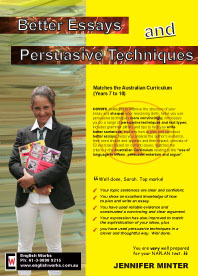 Please purchase Better Essays and Persuasive Techniques in order to access the Free Online Study Exercise Program: Buy Now: $24.95 (including postage).
Please purchase Better Essays and Persuasive Techniques in order to access the Free Online Study Exercise Program: Buy Now: $24.95 (including postage).
The editor believes that children should be involved in activities that help them enjoy childhood rather than getting stressed about homework.
- “ homework should be “dumped”: dogmatic and forceful.
- “let children be kids once they get home”: high-minded and assertive.
The editor believes that we must assess whether there is any value to homework in primary school.
- View: The author believes that homework does not serve any useful purpose in primary school.
- Audience: The editor’s discussion of homework targets teachers, parents and school children.
- Tone: sensible; rational; forthright; assertive. The author adopts an assertive tone to state that “it does not pass the test”. Because the editor is very forceful, they command authority and people are more likely to believe their views.
- Technique/ language: The editor uses a pun— that homework has does not “pass the test” — to discredit its purpose.
- Technique: The Editor refers to an expert organisation, the Australian Council of State School Organisations, to reinforce their point that homework should be “dumped”. This colloquial expression “dumped” makes a forceful impression and implies that homework is worthless.
- Purpose/impact: It suggests children are being subjected to unnecessary stress, which is likely to make both parents and children alike feel anxious. Teachers may, understandably, have mixed reactions.
- Appeal to health and well-being/fear: The editor places a higher priority than many on the children’s health and wellbeing and their personal happiness. By acknowledging children’s and parents’ fears about homework, the editor seeks to win support from parents who worry about their children becoming tired and stressed.
- Appeal to morals/attack: “Schools should be a fun place of learning.” “Let children be kids once they get home.” (parental responsibility/ high-minded tone.) The editor believes that homework should not be given to children if it is stressful. The editor seeks to isolate teachers and schools that give children so much homework that it becomes stressful.
- Technique: appeal to family values: The Editor also appeals to family values when he states that “let children be kids once they get home”. This suggests that homework denies them a childhood.
Exercise 17: The potato sack deception, p. 45
“The potato sack deception” by Mr Harry Jon
Mr Jon states that the Government should ban the burqa because it helps people disguise their criminal activity.
- “Clearly in light of this disturbing trend..” : forthright, assertive, dogmatic, confident.
- “How do we know who’s hiding behind…”: inflammatory; provocative; challenging.
- “Its use is shaming their religion”: moralistic and self-righteous.
Mr Jon adopts a dogmatic tone to warn the government that it “has no option but to ban the burqa”.
- View: Harry Jon (Coolabar) maintains that the government should ban the burqa in public because he believes that the public will associate people wearing the burqa with criminal activity.
- Tone: Mr Jon comments with an authoritative tone that “its use is shaming their religion and is of no benefit to anyone.”
- Technique: If its use is shaming their religion, then Mr Jon is also introducing a moral appeal (hence a self-righteous tone). He seeks to exclude those who may be guilty of criminal activity.
- Technique: Mr Jon asks a rhetorical question, “how do we know who’s hiding behind those potato sacks?”
Impact/purpose: This statement strikes fear into members of the public and undermines their sense of safety in the community. It may also inflame racist sentiments. - Tone: The tone of the question is provocative and inflammatory.
- Technique/ attack: The word “potato sack” deliberately ridicules the burqa and those who wear them.
- Technique: Mr Jon appeals to common sense. He implies that Muslims should recognise that the ban is sensible because it will prevent people from misusing the burqa and from wearing it for deceptive purposes.
Continue your Better Essays Learning Journey
- See Chapter 3: Persuasive Strategies
- Return to the Better Essays Home Page